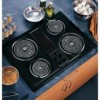GE JP389BJBB Use and Care Manual - Page 13
Types, of Cookware
 |
UPC - 084691123736
View all GE JP389BJBB manuals
Add to My Manuals
Save this manual to your list of manuals |
Page 13 highlights
Types of Cookware The following intbrmation will help you choose cookware which will give good performance. Stainless Steel: highly recommended Especially good with a sandwich clad bottom. The sandwich bottom combines the benefits of stainless steel (appearance, durability and stability) with the advantages of aluminum or copper (heat conduction, even heat distribution). Aluminum: heavy weight recommended Good conductivity. Aluminum residues sometimes appear as scratches on the cooktop, but can be removed if cleaned immediately. Because of its low melting point, thin weight aluminum should not be used. Copper Bottom: heavy weight recommended Good performance, but copper may leave residues which can appear as scratches. The residues can be removed, as long as the cooktop is cleaned immediately. Porcelain/enamel: Good performance only with a thick, fiat, smooth bottom. Avoid boiling dry, as porcelain can melt and fuse to the surface. Glass-ceramic: usable, but not recommended Poor perforraance. May scratch surface. Stoneware: usable, but not recommended Poor performance. May scratch surface. Cast Iron: usable, but not recommended Poor perfo_raance. May scratch surface. • We recommend that you _..... , use only a fiat-bottomed wok. They are available at your local retail store. The bottom of the wok should have the same diameter as the surface unit to insure proper contact. • Do not use woks that have support rings. This type of wok will not heat on radiant suFfaces. • Some special cooking procedures require specific cookware such as pressure cookers, deep fat fryers, etc. All cookware must have fiat bottoms and be the correct size. The cookware should also be covered, if applicable to the cooking process.















